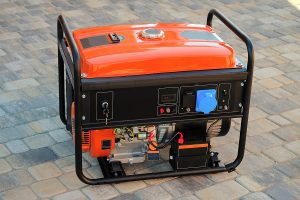Home Generator Safety Tips Every Homeowner Should Know
A home generator can be a lifesaver if you live in an area prone to power outages during storm season. Power outages can be inconvenient and uncomfortable, and if you rely on power for medical devices or even just refrigerate your medication, having a reliable generator can be essential. With a generator, you can weather a storm far more easily – and comfortably. However, generators do come with risks of their own. If you opt for a generator as your backup plan for power outages, you must make sure you understand how to own and operate that generator safely.
Follow the Manual to Avoid Mistakes
So many of us are guilty of thinking we know better than the manual. Your friend did something, and it was fine. Your cousin told you they exceed the “recommended wattage” all the time, and they’ve never had a problem. Your neighbor told you the only maintenance he does is keep the fuel tank full. Many generator owners skim the manual when installing the generator and forget about it. Every generator has specific guidelines for operating and maintaining the system, and ignoring those guidelines, either because you never read them or just don’t think they’re important, can cause accidents and cause your generator to fail. Always follow your manual’s instructions and quickly address any system alerts or notifications.
Always Run Your Generator Outside
No matter how bad the weather is, your generator does not belong inside. Ever. And yes, that includes the garage. Your generator should only be run outdoors in a well-ventilated area, at least twenty feet away from doors, windows, and vents. Ignoring this rule can put your family at serious risk. Your generator produces carbon monoxide, just like a car. Allowing your generator to put that deadly exhaust into your house is extremely dangerous. Keep it outside, make sure the intake and exhaust areas are clear, and install carbon monoxide detectors in your home, just in case.
Know How to Fuel Your Generator Correctly
Your generator can run on different types of fuel. Some generators use propane, some are fueled by natural gas, and some can use diesel or unleaded gas you can pick up from the gas station. Make sure that you are using the right fuel for your generator, which will be specified in the manual. If your generator is connected to a propane or natural gas tank, monitor the levels and schedule deliveries when your tank is at about 50% to prevent running out of fuel. If your generator uses fuel, you can take care of yourself, make sure you refuel in a well-ventilated area, clean up spills properly, and ensure the area is clean and dry before starting the generator. Never refuel your generator while it’s running, and make sure there are no leaks.
Never Backfeed Through Your Home Wiring
Backfeeding a generator – connecting a portable generator to your home’s electrical system through a wall outlet without proper safety devices – is extremely dangerous and illegal. It will damage your generator and your home’s electrical system, cause a house fire, and put utility workers at extreme risk. Always connect through a transfer switch or an interlock kit.
Use Extension Cords Correctly
Overloading your generator is a surefire way to cause overheating and even system failure. Make sure that you understand exactly what your generator can handle. If you connect an extension cord directly to your generator, make sure that the cord is heavy-duty enough to handle the voltage and that you are keeping tabs on how much strain you put on the system. Never connect a chain of extension cords to attempt to “stretch” your power. Read your manual and follow the instructions for best practices.
Regular Maintenance Keeps Your Generator Operating Safely
If you ignore your generator until you need it, you may find yourself with a non-functional generator during a power outage or a generator that is no longer operating safely. For best operation:
- Keep the area around your generator clean and debris-free, removing anything that could block ventilation or cause a clog.
- Test your generator monthly – a quick check is usually all you need.
- Schedule yearly maintenance. The professionals will look at the connections, the battery, and the filters to make sure your generator is ready when you need it.
Understand How to Troubleshoot Safely
Finding yourself with a failed generator during a power outage can be frustrating. But it’s important to understand what you can and can’t do safely to troubleshoot the issue. You can check the fuel and fluid levels, check for signs of overheating, and reset a tripped breaker. But you should not attempt anything more complex without calling in the professionals. DIY electrical work you found on YouTube – especially with a home generator – can be a serious safety hazard for you, your family, and your home. Know what you can and can’t do to troubleshoot the problem and then call in the professionals.
Your generator can be amazing during a power outage – if you use and maintain it correctly. Keeping your family safe should always be your priority. When you decide to use your generator, take the time to understand what you can and can’t do so you can stay protected.
Stay safe and power-ready year-round with experienced generator support. Contact Oakwood Electric & Generator today for maintenance, repairs, or a professional installation you can trust.